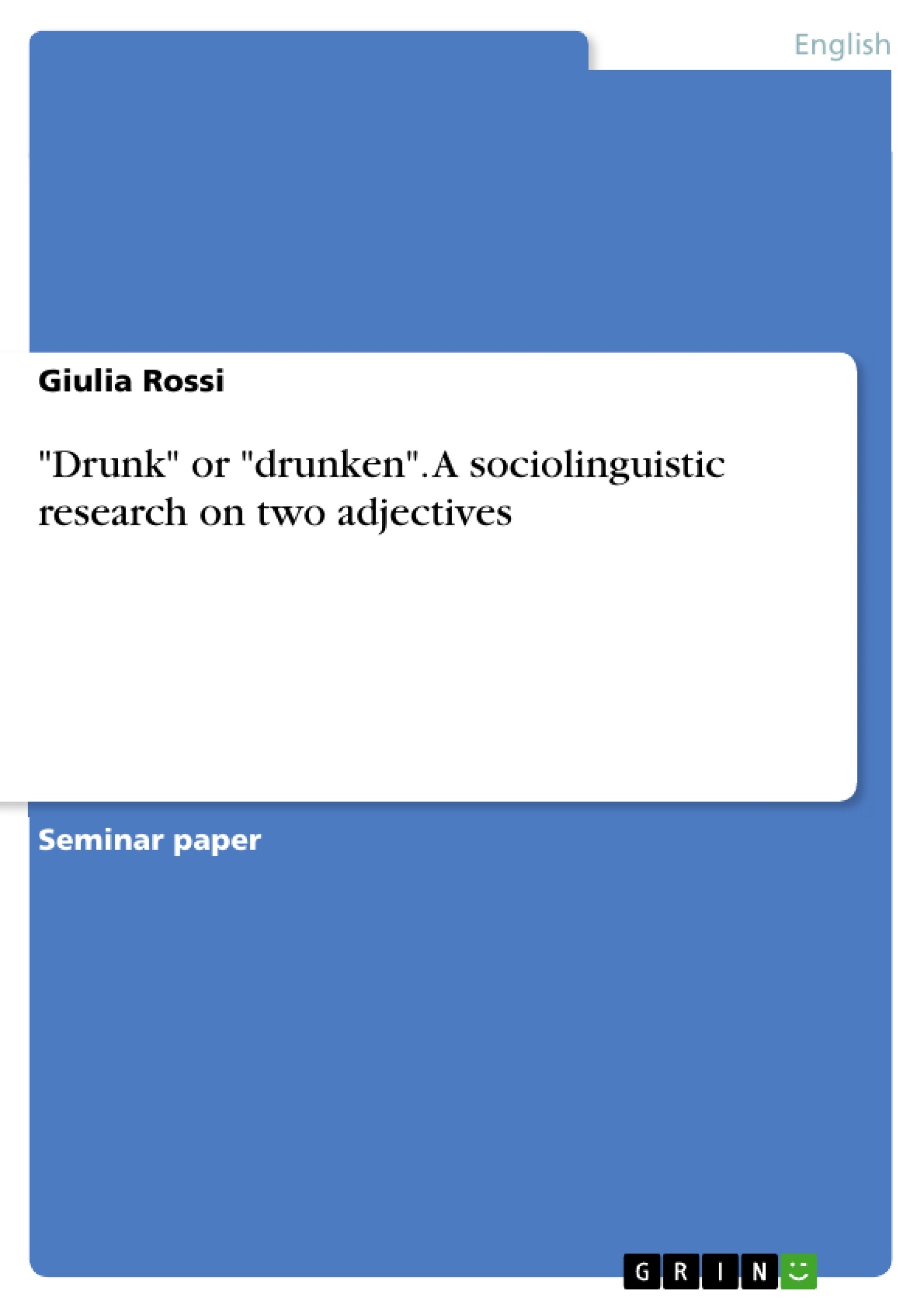This paper sets out to examine the use of the adjectives "drunk" and "drunken". According to the Oxford English Dictionary the definition of "drunk" is "Affected by alcohol to the extent of losing control of one’s faculties or behaviour", and that of "drunken" reads "Drunk or intoxicated". Consequently, their use on the lexical level seems to be the same and, therefore, interchangeable. Both expressions are used in temporary English and are not antiquated. Thus, the question may arise whether other factors determine the application of each of these adjectives.
The field of sociolinguistics deals with such questions of variation in language or more precisely in the use of different expression denotating the same meaning, while it does not simply assess different utterances as either correct or incorrect. Sociolinguists like Sali Tagliamonte rather examine language influencing variables like discourse features, social patterns or linguistic patterns, of which the two latter ones will serve as the investigative frame of the two adjectives "drunk" and "drunken".
In order to probe thoroughly into the usage of these two words, this paper, firstly, delivers a look into previous research on, and into the theoretical background of the respective adjectives. Secondly, the original data, namely the British National Corpus, and the gained random samples from this corpus are characterized, whereafter the methodology of coding for social (accent, sex and social grade) and linguistic (various syntactic functions) features is explained. The results and analysis of this coding for factors which may influence the usage of "drunk" and "drunken" are, thirdly, presented quantitatively and qualitatively in the two sections of social patterns and of linguistic patterns. These two analyses are discussed separately as well as in view of the respective other patterns to gain the deepest possible insight into the findings of this linguistic research. Finally, this paper is completed by a conclusion, which rounds off the linguistic intention to examine whether social and linguistic variables influence the usage or preference of the synonymous adjectives "drunk" and "drunken".
Inhaltsverzeichnis (Table of Contents)
- Introduction
- Previous research/theoretical background
- Data and methodology
- Data
- Methodology
- Results and analysis
- Results and analysis of social patterns
- Results and analysis of linguistic patterns
- Quantitative results
- Qualitative analysis
- Discussion
- Conclusion
Zielsetzung und Themenschwerpunkte (Objectives and Key Themes)
This paper explores the use of the adjectives "drunk" and "drunken" in the English language, aiming to identify factors influencing their usage. The study investigates how social variables, such as gender, social class, and accent, interact with linguistic patterns, such as syntactic functions, to determine the preference for one adjective over the other.
- Social variations in the use of "drunk" and "drunken"
- Linguistic patterns in the use of "drunk" and "drunken"
- Relationship between social variables and linguistic patterns in adjective usage
- The impact of grammatical theories on the analysis of "drunk" and "drunken"
- The role of the British National Corpus in linguistic research.
Zusammenfassung der Kapitel (Chapter Summaries)
The introduction of the paper establishes the research question by exploring the definitions and interchangeability of the adjectives "drunk" and "drunken." It introduces the field of sociolinguistics and its relevance to analyzing language variation.
Chapter 2 delves into previous research and theoretical background, examining how social variables like gender, social class, and dialect have been investigated in relation to language use. The chapter also explores existing linguistic studies on adjective classification and the use of "drunk" and "drunken."
Chapter 3 outlines the data and methodology employed in the study. It describes the British National Corpus (BNC) as the primary source of data and the specific search criteria used to identify instances of "drunk" and "drunken" as adjectives.
Chapter 4 presents the results and analysis of the data. The results are analyzed both quantitatively and qualitatively, focusing on social patterns and linguistic patterns observed in the use of the two adjectives.
Chapter 5 provides a discussion of the findings, comparing the results of the social and linguistic analyses and examining the implications for understanding the usage of "drunk" and "drunken."
Schlüsselwörter (Keywords)
The main focus of this paper is on sociolinguistic research, adjective usage, and variation in English language. Key themes include social patterns (gender, social class, accent), linguistic patterns (syntactic functions, attributive and predicative use), and the British National Corpus. The research also explores grammatical theories related to adjective classification and the analysis of "drunk" and "drunken" as synonymous adjectives with potential variations in usage.
Frequently Asked Questions
What is the research question regarding "drunk" and "drunken"?
The paper investigates whether social or linguistic variables influence the preference for using "drunk" versus "drunken," given that they appear synonymous and interchangeable at a lexical level.
Which social variables are analyzed in this study?
The study codes for social features including accent, sex (gender), and social grade to see if they impact word choice.
What linguistic patterns are examined?
The research looks at various syntactic functions, specifically comparing attributive and predicative uses of the two adjectives.
What is the primary data source for this linguistic research?
The study utilizes random samples from the British National Corpus (BNC) as its primary data source.
How does sociolinguistics differ from traditional grammar assessments?
Sociolinguistics examines variation in language use without simply labeling utterances as correct or incorrect, focusing instead on influencing variables like social patterns.
Are "drunk" and "drunken" considered antiquated words?
No, both expressions are used in contemporary English and are not considered antiquated, which justifies the search for other factors determining their application.
- Arbeit zitieren
- Giulia Rossi (Autor:in), 2017, "Drunk" or "drunken". A sociolinguistic research on two adjectives, München, GRIN Verlag, https://www.grin.com/document/476695



